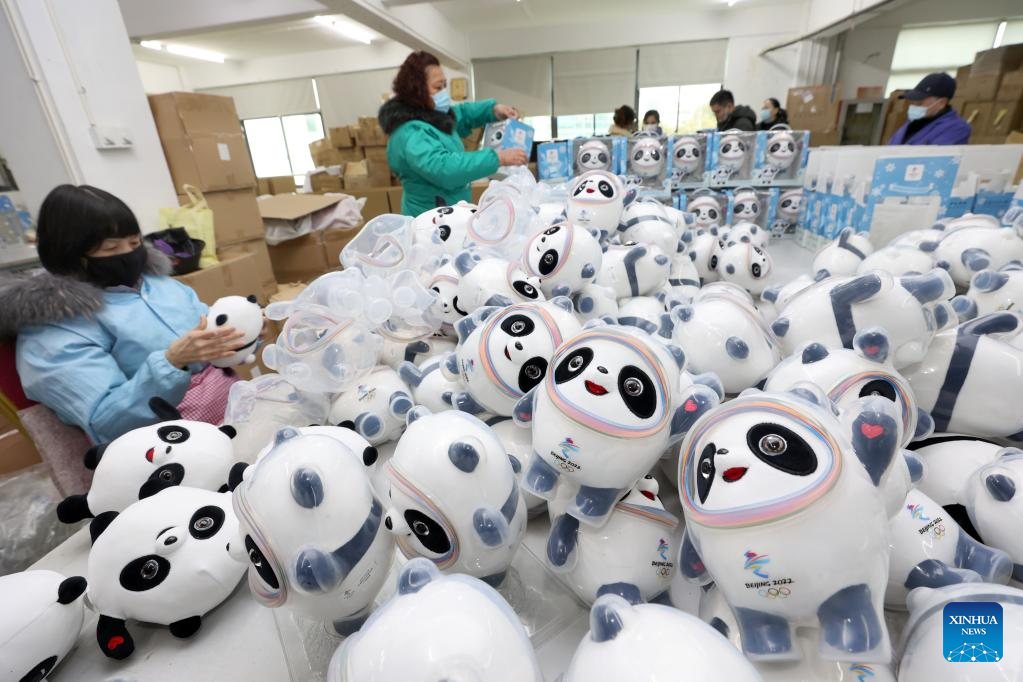Hard-to-get mascot proof of IPR efforts
 0 Comment(s)
0 Comment(s) Print
Print E-mail China Daily, February 15, 2022
E-mail China Daily, February 15, 2022

The overwhelming demand for Bing Dwen Dwen merchandise has demonstrated China's determination to protect Olympic symbols, officials and legal professional said.
Since the Beijing Winter Olympics kicked off on Feb 4, the cuddly Games mascot-a panda enveloped in an ice crystal shell-h(huán)as become a favorite with competitors, sports fans and the media.
Athletes in the Olympic Villages-in the Beijing, Yanqing and Zhangjiakou zones-h(huán)ave been sharing their moments with the panda in photos and videos, while Bing Dwen Dwen fans outside the Games' bubble have patiently waited to buy products from licensed stores and through official online channels.
The enthusiasm for the mascot merchandise has led to a shortage of products, with many netizens complaining that it's too difficult to get a Bing Dwen Dwen doll.
Zhang Zhicheng, a spokesman for the National Intellectual Property Administration, said the difficulty buyers face in getting merchandise demonstrates the country's stronger and more comprehensive protection of Olympic symbols.
"As the mascot has Olympic symbol protection, it also receives patent, trademark and copyright protection," Zhang said at a news conference organized by the 2022 Beijing Media Center on Monday.
Comprehensive intellectual property protection guarantees the rights and interests of IPR owners, and also promotes the dissemination of Olympic culture, he said.
"Comprehensive IPR protection is our way of keeping Olympic rules and of implementing the Olympic Charter. It's also symbolic of our respect for every athlete, and encouragement for technological innovators at this sports event," he said.
Sun Lei, an IPR lawyer at Yuanhe Partners in Beijing, said that difficulty in buying a Bing Dwen Dwen doll reflects enhanced awareness of the importance of protecting Olympic symbols, adding that thanks should go to the country's early warnings on the issue and other measures.
After Bing Dwen Dwen and Shuey Rhon Rhon, the baby red lantern mascot for the Winter Paralympics, were unveiled in 2019, the Beijing Organising Committee for the 2022 Olympic and Paralympic Winter Games issued a notice on the comprehensive protection of both mascots.
It stipulated that no individual or department could use the images or names of the mascots for private reasons, nor distort or tamper with them in any other fashion. It added that using the images in anything other than the official designs was also prohibited.
"In other words, people were told what they could do and couldn't do well before the Games. They knew they would have to go to licensed online or physical shops to buy Games-related merchandise," Sun said. "That's why we rarely see counterfeit Bing Dwen Dwens on the market, or the abuse of Olympic symbols on other goods."
So far, 63 Olympic symbols, 14 patents and 315 trademarks submitted by the organizing committee have been placed under all-encompassing protection, according to the National Intellectual Property Administration.
Sun said individuals and retailers should strictly abide by the Regulations on the Protection of Olympic Symbols, "as misuse may not only infringe on the IPR, but also damage the country's interests".
In October, the administration launched a campaign on protecting Olympic symbols, increasing inspections of markets and e-commerce platforms. The campaign will continue until the end of June.
In a case disclosed on Monday, a retailer surnamed Ren was sentenced to one year in prison and fined 40,000 yuan ($6,290) for selling counterfeit Winter Olympics mascots. It was the country's first criminal case involving harm to the copyright of the mascots.
Reviews of trademark and patent applications involving the Beijing 2022 Winter Games have also been strengthened to prevent Olympic symbols and the names of athletes from being misused.
As of Monday, the administration had rejected 429 trademark applications involving Bing Dwen Dwen and freeski Big Air champion Gu Ailing, announcing that 43 trademarks had also been invalidated.
Kang Lixia, an IPR lawyer at the Beijing Xuanfa Law Firm, said that the timely campaign, harsh punishments and strict reviews have contributed to keeping the Games running smoothly. "The strong protection of Olympic symbols and countermeasures against IPR violators have also shown that China is on its way to being an IPR power, which will help us build a good global reputation and encourage innovators," she added.





